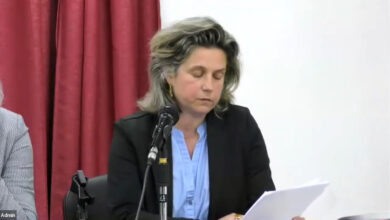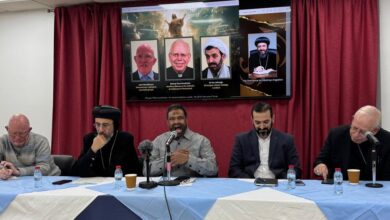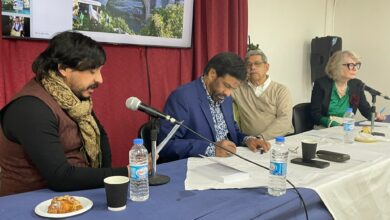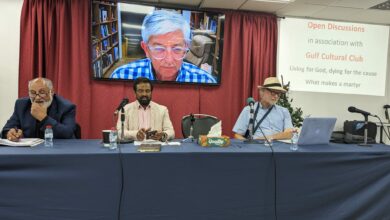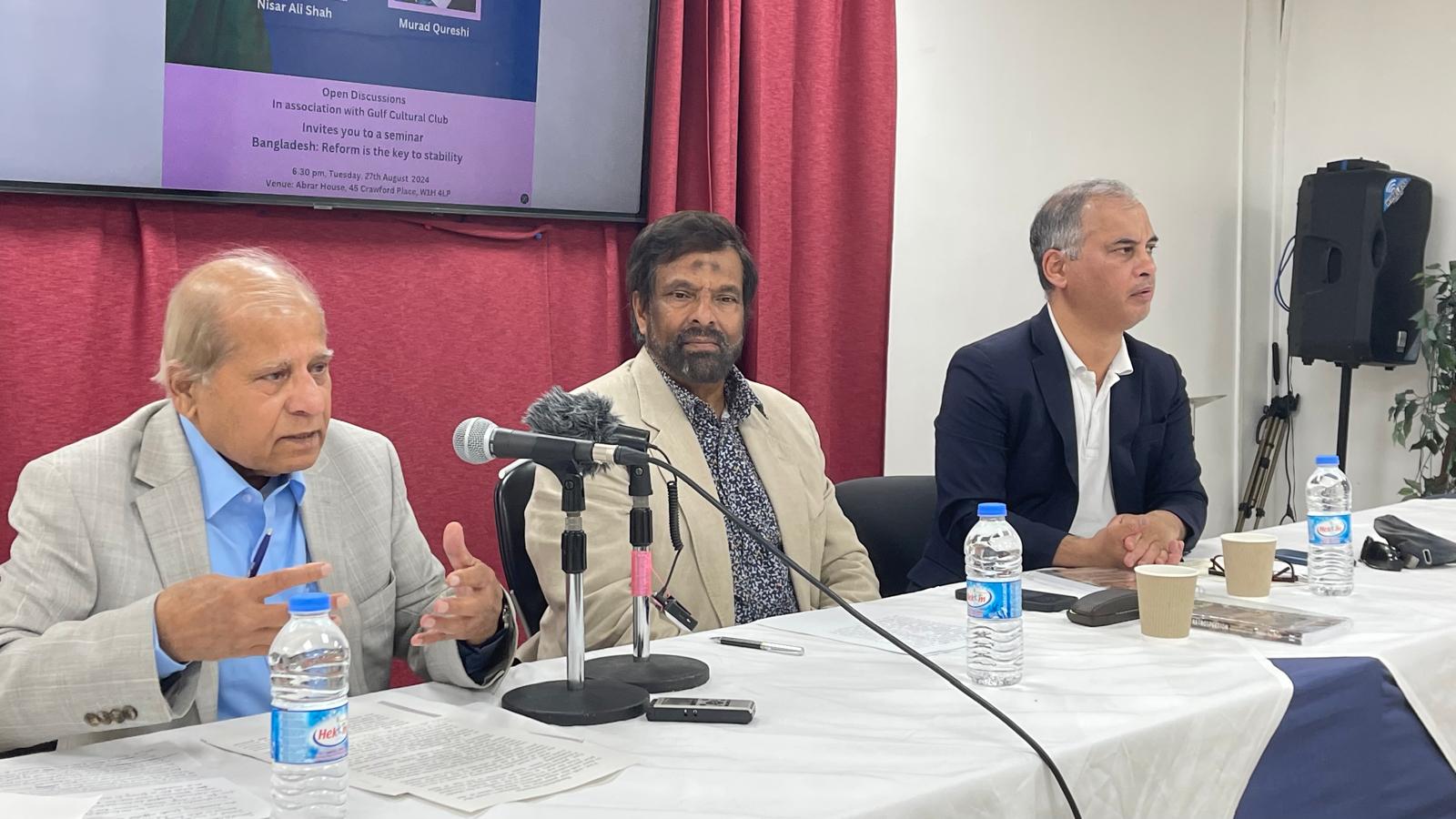
Bangladesh: Reform is the key to stability
Open Discussions هin association with Gulf Cultural Club
Bangladesh: Reform is the key to stability
*Murad Qureshi (ex counsellor community worker)
**Nisar Ali Shah (author, journalist)
Tuesday 27th August, 2024
Weeks of anti-government protests have toppled Bangladesh’s long-serving prime minister Sheikh Hasina, and an interim government has been formed. Led by the Nobel Prize Winner Mohammed Yunus, the new government is tasked with overseeing a smooth transition to a working democracy to satisfy those who led what is considered to be the first popular revolution since independence in 1971. The country is in a race to achieve stability through the ballot boxes and contain the political role of the armed forces. It is also a competition for power between the traditional forces and Islamist parties some of which may resort to violence to impose their agendas.
Will the ousting of Sheikh Hasina herald a new dawn for democracy in Bangladesh where the rule of law and human rights are respected? Or will the cycle of violence and repression continue?
Murad Qureshi: I am grateful I have this opportunity to talk on this subject. For obvious reasons it is close to my heart. I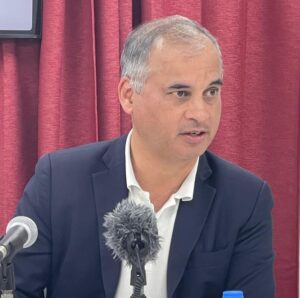 am grateful that this forum with the Gulf Cultural Club has given me this opportunity. The emphasis is always on the Middle East and Muslim countries. And that is where I am coming from. I have been travelling to Bangladesh since my childhood. My parents made their money in London in the 60s. They had a home and they had a business in the West End. The decided to go back and settle in what was then East Pakistan. We went there before the 1970 general election and saw the subsequent events of liberation.
am grateful that this forum with the Gulf Cultural Club has given me this opportunity. The emphasis is always on the Middle East and Muslim countries. And that is where I am coming from. I have been travelling to Bangladesh since my childhood. My parents made their money in London in the 60s. They had a home and they had a business in the West End. The decided to go back and settle in what was then East Pakistan. We went there before the 1970 general election and saw the subsequent events of liberation.
As a kid I didn’t understand what was happening – the pressures that were there. But when I look back it was clear that we had to come back to London. We were able to do so because we had British passports and we were able to cross the border into India and come back out. Little did we realise that soon afterwards the Pakistani army would capitulate to the Indian army. There is no doubt that the Indians played a critical role.
Suddenly there are a lot of new found experts on Bangladesh. Normally it does not get this amount of attention. I would suggest that it is not quite a replay of what has happened in Egypt after the Arab spring. But it is on its own unique cross roads which have their own particular history which I will just outline in brief.
Clearly the thing that Professor Younis needs to deal with is law and order. It is quite hellish. I am talking to my cousins and if you listen to them it is quite hairy. There was been a backlash against the Awami League politicians. For example on 15th August when Indians and Pakistanis are celebrating independence we are usually in mourning because that is the date that the founding father of Bangladesh was assassinated in 1975. In the days leading up to that they actually burned down his ancestral home. That is how bad the law and order situation has got. It was accepted as a monument to those tragic events but it was actually burned down. My sister lives opposite and it was pretty hairy for her and her family.
Law and order is paramount. Any regime would have to do this but I think it is critical. It is not just law and order and reparations against those politicians who were in power literally over six months ago. It is also about minority communities and it is a great tragedy that we are seeing this unfold.
I am a minority here in this country and I would like to think that I am respected as much as minorities in Bangladesh. The key linguistic/cultural division has always been Muslim/Hindu. This has been since time forever. The Bengal state previous to 47 independence in ancient times was much the same and also in medieval times. More recently in 1947 there were contradictions – people opted into a Pakistan state when we had actually a 30 percent minority then. I think it is a great tragedy that their number has gone down to 10 percent and they feel under threat at the moment.
The constitution of Bangladesh does give emphasis and it is incumbent on all good Muslims to make sure that minorities are protected. It is not just Hindus but Buddhist and Christian minorities exist there. These are the main issues that Professor Younis needs to get on top of.
The political system itself is not dissimilar to here. It is a binary first past the post system. Let’s face it. The only choice we have here is between Labour and the Tories and it is not dissimilar to Bangladesh. There is the Awami League which is the party that gave liberation to Bangladesh and the BNP the Bangladesh Nationalist Party. That was the party that was formed amongst the military and took over after the assassination in 1975. They realised that they needed a legitimacy and they formed their own party and it has been in existence for some time.
More recently they have not been standing in elections because of major concerns about the way the elections have been run. The last two or three elections were clearly rigged. There is no two ways about it. The last one was in December last year. I was there at the beginning of December and this was confirmed by friends and family. In 2018 something similar happened. This was a victory to big for the stability of the country and I am sorry that is what transpired.
What you have then is a binary political system. If one party gets in it just grabs everything. That is what has happened. The issue was the quota system and the jobs for the liberation fighters and their families. That was not the only issue. It was just a trigger.
To reform the system I am not talking about getting rid of political parties. I think you should leave people to set up what they think is best in the political system but some form of proportional representation would make a lot of sense. I would like to get away from the binary system which we have had not only here but also in countries like Bangladesh. I don’t know if that is something that Professor Younis would consider but if I had the opportunity right now I would advocate that.
So that is the politics internally in the country. The economy is actually very dependent on two things, the garment industry – textiles. That is something I have always found very healthy to see. The colours. It is interesting that the garment workers did not actually get too involved in all this but they were there. They bring in the hard foreign currency along with all our migrants – particularly those in the Middle East. They send their hard earned cash back as in Pakistan. But the economy is far to dependent on those two sources of income. It is the nature of the global economic system which means they become dependent.
If you go shopping next time to Marks and Spencers certainly the men’s wear all comes from Bangladesh. They are dependent on the garments industry as well as the remittances. Professor Younis is an economist so if he comes up with some kind of strategy to move on beyond that I would be very grateful but I think that is going to be more difficult than you realise.
Then there is the geo political stuff. I think that may be overemphasised. The contending forces are the USA, India and China. I don’t know if you follow Mr Modi’s twitter account or sleepy Biden’s twitter account or the State Department’s. Modi put out a tweet last night that he had spoken to Biden about his trip to the Ukraine and he also mentioned what was happening in Bangladesh.
It transpires that sleepy Joe forgot completely what he said about Bangladesh and concentrated on the Ukraine. The State Department did not even mention it. I think that shows the importance of Bangladesh for India. The most difficult bit of India to keep on top of is around Bangladesh. Ninety percent of the boundary around Bangladesh is India. That is a sharp reality check for anyone. Those are the geographical considerations.
The Chinese are there. They are probably more in with Myanmar and what is happening there. They have ambitions to put infrastructure in there. I think one of the things Sheika Hasina was doing reasonably well was playing the geopolitical game of one against the other. She may have lost sight of the domestic agenda which is evident but on the geopolitical front she was playing the game reasonably shrewdly and there was a possibility of Bangladesh joining the Bricks in October. I don’t think that will happen now. It is too unstable for that to happen. So that is the geopolitical thing.
The final thing we should not forget and it is a real check on reality is that we have had major floods in Bangladesh. Five million people have perished. There is an argument here. The finger has been pointed at the Indians that they have released their dams on the eastern flank. The floods have not come from the Ganges in the Himalayas – they have come from the side of Bangladesh.
That raises some very interesting issues about the geography of the place. Let’s face it those boundaries were not marked out by local Indians or Bengalis at the time. It was actually Redcliffe. He was sent from Britain to mark out the boundaries of a Muslim state in the Indian subcontinent. He drew these boundaries on the basis of religious configuration rather than the geography of the location. It is madness in terms of hydrology. This is pretty insurmountable because the political boundaries do not reflect the actual geography or hydrology of the place. Rather they were set up from the religious make up of Bengal in 1947 which has changed anyway.
So on that point I think we are at a cross roads. I hope to see some political reforms as I have suggested towards proportional representation. The economy has to move away from political dependence on remittances and the geopolitics they have got to get their heads down and concentrate on the local and regional stuff. The time has done for that and I am not sure the Americans are interested as some people would suggest. They have got involved in other things in Pakistan and there will be this game playing in Dacca but if you look at the geography it is not as significant a land mass as the Bay of Bengal. It is probably more important for India and China. So that is enough food for thought and we can have a discourse after.
Nisar Ali Shah: Bangladesh is burning, Bangladesh is bleeding, it is underwater because of the floods. India opened the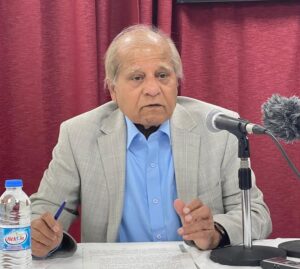 dam. The dam in India is slightly higher. The floods affected 4.5million people. Twenty eight people died straight away.
dam. The dam in India is slightly higher. The floods affected 4.5million people. Twenty eight people died straight away.
From the conflict in Ukraine to the conflict in the Middle East particularly in Gaza and in the brutally occupied Palestinian territories we are experiencing increasingly challenging times in what has been described as a prelude to WW3. With so much uncertainty the role of journalists has been compromised if not prostituted in the world by the powerful media barons and you know who they are. The result of this is that articles written about the Gaza-Israel conflict criticising Israel’s terrorising the entire population of Palestine, Lebanon, Syria and Iran are taken by the supporters of Zionism as anti- Semitism by most of the news editors that I have come across. This is the nature of journalism today. So I am imploring my colleagues in the NUJ to report about this tragic Gaza conflict and not in a one sided way. If you say that Israel has the right to defend itself your article is more likely to be published. But if you write the ICJ has declared that Israel is committing crimes against humanity and Netanyahu and his defence minister ought to be arrested and brought to justice in the Netherlands this is most likely to be rejected as anti Semitism.
Bangladesh is confronted by multiple problems some man made, others are natural calamities such as the cyclone and flooding. We saw that the student protests continued for weeks. The ousted prime minister refused to meet the students demands and tried to quell the movement through the use of brute force. More than 800 protesters were killed. Twenty two thousand were injured. The death toll could be more. The police arrested more than 11,000 student activists. Hasina did whatever was possible to crush the protesters. Despite this brutal repression the movement continued and led to her sudden departure. She ruled with an iron fist for 16 years and then fled to India. She fled when the protesters reached her residence. She was advised to leave by the army and by the police and she was bundled out to India by helicopter.
The protestors then demanded the re-opening of college and university campuses and the release of those arrested. There was no demand for her resignation at that stage. When she refused to accept these demands the protestors returned to the streets again.
Instead of engaging with the students she resorted to aggressive measures relying on the police and the army to deal with the students. She also under estimated the anger and discontent that existed in the country. She believed as the economy was growing at a high rate her tenure was not in danger.
To be fair the economy in Bangladesh continued to grow during her premiership. While the ruling classes was happy many sections of society were left out. Millions suffered from the cost of living crisis. Energy prices increased two fold and youth unemployment remained high. The capitalist elite harvested huge wealth at the cost of the working people. Young people are not interested in joining the private sector due to low wages and the causal nature of the jobs.
These were the events that led to vast protests against the government. Young people were not satisfied with the economic situation and the lack of decent job opportunities so naturally frustrated was high among university and college students.
When the Bangladeshi High Court restored the 56 percent quota for the families of those who fought in the war of independence in 1971. The young people lost their patience and took to the streets. Even though the Supreme Court of Bangladesh overturned the High Court decision and fixed the quota at 6 percent it failed to pacify the students. Unemployment was very high and there was a zero tolerance policy to dissention. She claimed to have won the elections which were boycotted by the opposition parties. The High Court ruling on the quota system triggered a movement that was waiting to erupt. As soon as the army refused its support the government collapsed.
The interim government under Dr Mohammed Younis is installed now. He is a renowned economist and is regarded as people orientated. According to the Bangladesh constitution the interim government can run the country for up to six months. Mohammed Younis was out of the country in France when Hasina was in the government and now that Hasina is out of the country he is power.
The economic situation will not improve without a change in policies and drastic radical reformation. The students and the young ones have paid a heavy price for their country and this is a revolving revolution. It is not going to stop here.
Dr Younis has promised in his first policy speech full support for the refugees who were kicked out by Myanmar in 1979. A few weeks more of them were expelled from the same region. It is hard to believe that Myanmar as a Buddhist country takes such a cruel step to persecute its own citizens and then to expel them out of the country.
One outcome of this revolution is that after the one woman rule for 16 years the relationship with Pakistan will improve. The Prime Minister offered assistance to cope with the devastating floods. Indeed the people of Bangladesh have shown bravery and courage particularly in the face of adversity.
Hasina wanted to come to the UK but the response of the Home Office is not known yet. Hasina’s sister’s daughter Tulip Siddiq is the Labour MP for Hampstead and Highate. She is a minister in Keir Starmer’s government. She may ask for her aunt to come here. In view of the large Bangladeshi community in Tower Hamlets and some other areas she may not feel safe here. The ousted prime minister’s diplomatic passport has been revoked. So she might try and join her son in the USA where he is resident. In India where she is housed in a secret place she said that the US interfered in regime change but she has refused St Martin’s Island as a base of America. This is the first time she has made such a statement. She never made this kind of statement when she was prime minister in Bangladesh. It is only after she was ousted she mentioned that.
Dr Younis the caretaker chief adviser of the interim government has vowed to have free and fair elections as soon as possible. But it is not actually very easy. I think it should be within six months. The constitution doesn’t allow to hang on.
Sheikha Hasina’s dictatorship has destroyed every institution in the country Dr Younis said. An adviser of the government Nahid Islam is a key student leader who is now in the government along with lawyers and academics and two retired generals from the Bangladesh army. He said during a press briefing that India has inhumanity by opening a dam without prior notice causing floods in Bangladesh. The people of Bangladesh are angry with this policy of India. He also said “We urge that India will refrain from this kind of policy against the people of Bangladesh. The relationship between India and Bangladesh looks friendly on the surface but in fact India has never reconciled itself with having a Muslim country on either side of the border. Bangladesh on this side, Pakistan on this side, India is always hostile to these countries. But Modi had some kind of relationship with Sheika Hasina. But I think it will change now.
I come to the quota from the fighters. This quota was announced in 1972. Bangladesh came into existence in 1971. It was decided that those who took part in the independence struggle should be allowed to have 30 percent of jobs for their children and grandchildren. At that time I remember it was 80,000 people who were allocated 70 percent for their children and grandchildren. Bangladesh gained independence on December 26th, 1971. Five percent is allocated to minorities like Hindus and there is also an allocation for disadvantaged people. There is also an allocation for disabled groups and people living in the mountains. That makes 56 percent. That makes 44 percent for the rest of the country. This triggered the students to do something about this quota system. It was ten percent for women.
But how this was implemented was that Shekha Hasina gave jobs to her own people in the civil service, the health department and all the other jobs for the boys. That is why the quota system was in place. Sheikha Hasina said her regime was interfered with by America. That is actually not true. John Liu the notorious man in the state department who interfered with Imran Khan and in the Ukraine. This is to be found out. The United Nations fact finding mission is expected to probe into atrocities, tortures and disappearances within that time.
Sheikha Hasina made a lot of mistakes. If she did not say it in Bangladesh she should not have said in Delhi that the USA has interfered in the regime change. As a result the US is not willing to grant her a visa to see her son in the US. This is to her disadvantage. Bangladeshis can cross the border and stay in India visa free. There is no visa across the border to go to India. They can stay there for 45 days. Sheikha Hasina has been in Delhi for 22 days so her luck is running out. After these 45 days she will be an illegal immigrant in India. Her diplomatic passport has been revoked. It is possible that the Bangladeshi government will seek her extradition and trial for abuses, torture and murders.
So this country Bangladesh: Bangla means Bengli and desh means homeland. The country has a lot of problems to solve. Tulip Siddiq despite her position in Keir Starmer’s government cannot do anything to get her aunt into the country. I will stop here and leave the rest for the q and a.
*Murad Qureshi grew up in Northwest and Central London where he attended his local comprehensive school in Westminster called Quintin Kynaston. He holds a degree from the University of East Anglia and MSc in Environmental Economics from University College London. Before becoming an Assembly Member, Murad worked in Housing and Regeneration for 15 years. He was an Executive Committee member of SERA (1994-2000) campaigning on green issues throughout the 1990s. Murad is a former was a member of the City of Westminster Council (1998-2006) and entered local politics through his family involvement in order to represent the neighbourhoods he grew up in on issues such as transport and the environment. Murad is a Board Member of BRAC UK, an International NGO that is part of the BRAC family. The organisation seeks to alleviate poverty and empower the poor in the UK and abroad. It is currently raising funds for relief and rehabilitation work in the cyclone affected areas of Bangladesh.
** Nisar Ali Shah is an author, a journalist, columnist and a researcher, who worked in Fleet Street newspapers and several ethnic media outlets for more than 30 years. He wrote on topics such as Palestine, Kashmir, Guantanamo camp and other topics. Recently he published a book: Journalism in Retrospection – Thirty years of Reportage. Nisar took his first steps into the world of journalism at the Civil and Military Gazette in Pakistan. He later joined the Times of Karachi before leaving for England. He studied at the London College of Communication. Nisar worked as a Reader at The Times and The Sunday Times and later progressed to sub-editor. He has been a member of the NUJ since 1987. His articles have been published in three continents.

